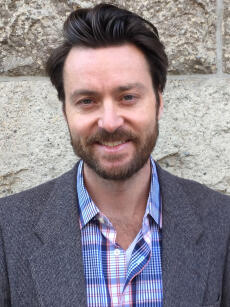How Liturgy Shaped Historiography
Visiting scholar Sean Griffin works on the Eastern Slavic Primary Chronicle

Early Medieval Historian of Rus and Byzantium Dr. Sean Griffin, from the University of California in Los Angeles, does research on Byzantine liturgy at the Cluster of Excellence “Religion and Politics”. During his stay in Münster, the visiting concentrates on studying the role of liturgy in the development of the oldest extant East Slavic chronicle: the Primary Chronicle from the 12th century. He is the first to investigate how the liturgy of the monasteries where the chroniclers lived influenced their historiographical writing and compiling. A monograph entitled “Byzantine Liturgy and the Making of the Rus Primary Chronicle” is scheduled for publication with Cambridge University Press in late 2017. Sean Griffin, from the University of California’s Institute of Slavic, East European, and Eurasian Studies, works at the Cluster of Excellence within the scope of a one-year postdoctoral fellowship in the humanities from VolkswagenStiftung and the Andrew W. Mellon Foundation. The Cluster of Excellence “Religion and Politics” is one of the official host institutions of the renowned programme. Sean Griffin collaborates with historians Prof. Dr. Heike Bungert and Prof. Dr. Eduard Mühle as well as with Byzantinist Prof. Dr. Michael Grünbart.
In spring 2017, the scholar is planning to host an international conference on “Ritual and Historiography in the Middle Ages, an event co-sponsored by VolkswagenStiftung, the Department of History of WWU and the Cluster of Excellence. From 31 March to 2 April 2017, scholars from across the world will discuss how liturgy shaped the writing of history in medieval Europe. Dr. Griffin will also teach a course on this subject in the summer term.
Regarding his liturgy work, the scholar explains that the East Slavic chroniclers of the Early Middle Ages lived in monasteries, their daily routine being strongly shaped by worship services and liturgy. They celebrated mass in the mornings, in the evenings and at night. The rituals had a marked influence on the chroniclers’ desk work. “It can be shown”, according to Griffin, “that the myth of origins for Rus – a myth promulgated even today by the Russian Orthodox church – originated in the liturgical services of the Byzantine rite.” Research of the visiting scholar focuses on the history of religions and of historiography, the history of techniques of rule and of Christian liturgy. (ill/vvm)

